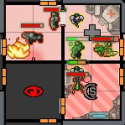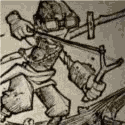|
Batrand - thrown weapon Trickle-smackdown - damages anyone who hits him for 1hp Gold Standard - some sort of morale effect, is literally a golden banner. gently caress you: land mine. Bull/Bear Market - one knocks them down, one throws them. Caveat Emptor - Will literally offer a PC money to attack a comrade. Free Agency - Move without provoking opportunity attack Enviromental hazards: A bitcoin rig (with fans pointed at them to blow unwary PCs in), does fire damage to anyone next to it. e: Read In Golden Waters for ideas, and also because it's awesome. Also, King of Bitcoin, etc. petrol blue fucked around with this message at 00:51 on Aug 15, 2014 |
|
|
|

|
| # ? May 20, 2024 13:13 |
|
Tomero_the_Great posted:Laissez Fire. Close blast? Laissez-Flare rolls off the tongue better. Also, be sure to hit someone with a Randhouse Kick.
|
|
|
|
mods change some troll's username to libertarian batman tia
|
|
|
|
petrol blue posted:gently caress you: land mine. It's so simple and yet so perfect.
|
|
|
|
Safety
|
|
|
|
Ayn Rend: deal X objective damage per round
|
|
|
|
The only time I've run something grim it was a perfect success. I found that the key to success is absolutely flipping a total success into something they didn't predict. My twist was an abnormal kobold history. I ran a typical level 1 kobold dungeon after the PCs were survivors of a crashed ship. They entered a huge base in the centre of the island, beat up a few guards. They descended the stairs, into a huge storage room, beat a few guards. They went into a side room, killed the kobolds there too. Went into the second last room, the clincher. It was a barracks, covered in bunk beds. One kobold attacked, but after he was brutally critted and cut in half by the paladin, the others cowered on top bunks or under beds or chests. The pcs killed everyone, and the wizard made a knowledge check after I dropped a hint (after a successful perception check) that these kobolds seemed... Different somehow. He succeeds the check and I hand him a note of his findings. His face goes grim, and the druid asks what the issue is. The wizards response is a quiet "It'd be better for everyone if you didn't know". They force him to speak and he explains that the previous knowledge checks were trying to discern how old the kobolds were. They just murdered a room full of children. That explained why the kobolds hid after their first friend died. The druid then checks the other kobolds, not children, but women. The paladin begins praying, and the party enters the final room... The party walks straight into an underground cavern covered in lush greenery. A massive tree grows over on a small mound. Flowers grow up the small hill, surrounded by a small steam to where a kobold and his dire bat sit. They climb down and greet the newcomers in plain common. Noting the blood, the kobold knows what has happened. He begs the now distraught PCs for one day to prepare, to bury the dead, and so he can die by honourable combat. The druid and the final kobold discuss why they stayed here if they were only women and children. The kobold, also a druid, explains there is a young white dragon they simply cannot leave. It is a God like figure to their kind at most, and at least a holy animal. It has been eating all the men for years, and their kind was dying off. They go to see the dragon. The druids meet with the dragon, everyone there conveniently capable of speaking common. The dragon scolds the kobold, and laughs at the druid. He demands solitude and the pair retreats back to the base. The PCs bring the final kobold all the bodies, and then he closes his doors for twenty four hours. The next day arrives and the PCs trudge in, emotionally battered. The final nail hits them. I queue some [URL= http://m.youtube.com/watch?v=csW3mAy3JyM] ambiance music. [/URL]The room is a dessicated husk of what it once was. The steam dried up, the grass and flowers sand and silt, the tree leafless and covering a row of graves, all in draconic but one. The last one, an open grave, scribed in Druidic. The final kobold's name. The kobold descends from his hill, ordering his bat to flee and never come back, throwing a minor spell at it to seal the deal. The druid PC does the same, telling his tiger to leave, not wanting the kobold to die to an animal. The kobold pulls his punches, resigned to his fate, until the paladin finally steps in to put an end to his sorrow. They read every grave, and bury the druid kobold next to the tree, when the druid PC realises something. His animal companion knows only two (I think) tricks. Kill, and heel. When he ordered it to leave, the animal interpreted it as "kill the fleeing bat". The cat drags in a dead bat to it's weeping master, and they bury it with the last kobold. Beside the tree is a stone book, written in Druidic. The druid summarises it as the history of this tribe, so that they can live on in death. The druid vows to turn this history into public knowledge, the paladin agrees. Then, the fighter pipes up. The dragon. A bloodthirsty party marches into the dragons chamber and unleash every resource they can bring to bear. I distinctly recall the paladin not breaking a grapple the dragon had him in because he needed to keep killing the false murderer god. The PCs kill the dragon, cut it up, and drag it's pieces down the tunnel to the other side miles away. A city, they were free of the island, the tunnel taking them under the sea to the nearby kingdom. In total, 3 players cried out of 5, and one still reminds me that he's never played a better game since. To this day I have never played a game I had loved more.
|
|
|
|
petrol blue posted:Trickle-smackdown Lurks With Wolves posted:Laissez-Flare treeboy posted:Ayn Rend Thanks guys. These are my favorites. I also came up with Hitgroin - the only stable investment of any standard action.
|
|
|
|
Horrorchat: Horror means a lot of things to different people. We tend to think of horror as a genre (which it is) but when you're tasked with evoking it you begin to realize it's actually pretty complicated, especially in TTRPGs. Horror (the genre) has expectations and tropes. You can play a game that is set in a horror-universe that is not actually very horrifying. This is your typical slasher one-shot where people play college students trapped in a cottage down by the lake or whatever. This is a universe where your players are actively aware that they are playing a horror game and will, you know, play what amounts to willing victims. I've played a bunch of games in this vein and they are a blast - just copy your typical horror movie for this effect. Ironically this genre usually works best as humor. There's shock-horror which basically is trying to come up with the most outlandish and grotesque thing you can think of and throwing it at the player characters. The trouble with this genre is that players often do their best to steadfastly refuse to be horrified. It can have unintended effects, and since so much of it relies on extensive explanation ("...you can see exposed muscles just under the...") it can really get in the way of itself. This works in movies because you can see it, instantly, and have to react to it. Gross-out can work but it's gotta be short and sweet. Gross-out that is oration friendly can be hard to manufacture. Psychological horror is a lot like satisfying mystery or romance - it requires setup, established characters, expectations (which you quickly dash) and an ability to hold back information without frustrating the players. A single severed finger is often more terrifying then an entire corpse, and that's because it forces the players to think about where it came from. This is easier in fiction than in TTRPGs because PCs exist to solve mysteries. If your horror-element (monster, slasher, whatever) does not want to be found this can put you at cross purposes with your PCs. Discuss your expectations in advance.
|
|
|
|
Jade Mage posted:His animal companion knows only two (I think) tricks. Kill, and heel. When he ordered it to leave, the animal interpreted it as "kill the fleeing bat". The cat drags in a dead bat to it's weeping master, and they bury it with the last kobold. 
|
|
|
|
For the record, the druid is the one who swears that game was the best, so I don't feel bad.
|
|
|
|
"Yeah, man, great game... Yeah... The best... No, sorry, I can't play this week either, I'm kinda busy." 
|
|
|
|
Then the other 75% of my games are completely insane. I set out to make a cult based prison thriller where they hunted down and destroyed cults, the players ended joining the cult of a dragon that can eat all of your history. It didn't help that the kobold in the party offered to be eaten. They proceeded to feed the dragon everyone and everything they saw, and started yelling "All hail the Lord in Red, praise be onto him" with the same zest as people saying "Praise the sun!". All in all, good times.
|
|
|
|
petrol blue posted:"Yeah, man, great game... Yeah... The best... No, sorry, I can't play this week either, I'm kinda busy." I think my FATE game might be biting the dust in this way  . The guy whose PC I was starting to pile plot poo poo onto is probably bailing. He's not the most proactive or creative, and his PC kind of drifted into a Very Special Episode about gay-curious feelings when one of the other players leveraged their character's seduction-related Aspect to help get pulled up from a pitfall hazard. He insists he's ok with how it's playing out, but he's also bailing on game nights because he supposedly doesn't have gas money. . The guy whose PC I was starting to pile plot poo poo onto is probably bailing. He's not the most proactive or creative, and his PC kind of drifted into a Very Special Episode about gay-curious feelings when one of the other players leveraged their character's seduction-related Aspect to help get pulled up from a pitfall hazard. He insists he's ok with how it's playing out, but he's also bailing on game nights because he supposedly doesn't have gas money.
|
|
|
|
Jade Mage posted:good times. To be clear, I was joking. Kinda. You might have damaged your players.
|
|
|
|
Well, they came back and brought friends the next time, so obviously I broke them right!
|
|
|
|
Jade Mage posted:Well, they came back and brought friends the next time, so obviously I broke them right! Good GMing: How to Break Your Players Just Right.
|
|
|
|
treeboy posted:Not super worried about objectification, especially as poo poo is bad enough there'll be plenty of time to threaten everyone in other situations. I feel like I should elaborate, since it's a really easy trap to fall into here. You want to avoid using characters only as mission objectives. This isn't to say you can't run rescue quests, but that you should never rely on a presumed relationship to convey drama. Compare Holy McLaine in Die Hard and Alyssa Milano in Commando. Holy and John were given a real relationship, had problems to work out, feelings for each other, and the unfinished business regarding their kids and divorce. All this gave John reasons to shoot his way through dozens of Germans to help Holly. If she died, nothing would get resolved. Now Commando doesn't have that. In that film we're given the basic premise that Schwarzenegger's daughter has been kidnapped. It plays to the audience's assumptions about family, and relies on those external assumptions to understand his motivation in exploding a drug cartel. (Or whatever those guys were.) The daughter isn't really a character; Commando could have been about revenge, recovering spy secrets, or a briefcase full of money. She's essentially a macguffin. Sure, you can rely on your players assumptions that sacrificing people is evil. Innocent children are always good, and it's easy to cash in on their associations. But you're going to have a much more memorable and developed story if they share a scene with the PCs to build up a relationship first. Consider something as simple as a kid breaking from play to giving one hero a flower. Her father yells at her to "Get away from those outsiders!" She runs in the house, Dad measures up the PCs, and confides that "Ilsa's too trusting of strangers. It'll get her killed someday, just like her mother..." Now you're got three potential victims to work with: The protective father, the trusting daughter, or the cold case missing mother. The father and daughter have both engaged the players, and their loss will be more meaningful than if a quest giver approached them about a missing person or object. And then what happens if the disappeared wife is alive, shacked in a cult dungeon? Or if she's abandoned her family to pursue the cult's goals? You can just do more with characters than macguffins. Use more characters.
|
|
|
|
Ah ok, I thought you were referring more to objectification in the specific use of a girl as a hostage. Yeah i definitely want there to be more of an interaction and emotional investment beyond Susie MacGuffin has disappeared. I'm considering having them find her in the woods ala the suggestion up above (so they've already *saved* her, she's safe back with her family), and then her family takes the party in while the rest of the town is somewhat suspicious of strangers. She specifically is the only (surviving/available) witness to the abductions as her friend/sister is one of the disappearances. The party has various things to investigate around town to figure out what's going on, when they return their little friend is missing and the house has been ransacked, the father has gone off to find her and they follow him. Ultimately she is kind of a throwaway (they might rescue her, they might not) but not so much so that she could be just as easily replaced with a tea kettle. edit: though the idea of the mother in the dungeon is a good one, i'd just have to figure out a decent time table for the sacrifices/rituals. If she's been gone for six months that's a little on the long side, but a day or two probably isn't long enough. Maybe a couple weeks without any evidence, and the father is constantly going out into the wild to look for clues to her disappearance, which is when they go for the daughter who runs away and that's what leads the adventurers to finding her...hmmm treeboy fucked around with this message at 20:33 on Aug 15, 2014 |
|
|
|
As a GM, my biggest weakness is probably creating stories. I'm fine running pre-existing adventures but creating hooks and plot threads is hard for me. What should I do when preparing for a game?
|
|
|
|
Also does anyone have tips for creating interesting fetch quests? I asked my players to each come up with an item that is important to their character, though for more sentimental/RP reasons than necessarily mechanical benefit. Ideally I'd like certain adventures through the campaign to focus on different characters, their background, etc. and then use that as an opportunity to make/reveal their item to have some special property. for instance, the easiest one i've already mostly figured out is my Fighter. His special item is a broken blade he obtained after defeated a particularly powerful foe prior to the story. He has the pieces of this incredible sword and has searched for someone capable of reforging it. Mechanically 5e doesn't have a bastard sword, so I made it a longsword but slightly better (2d4/1d12 instead of 1d8/1d10). There's a reclusive Elven city in the world they're adventuring in, and their smiths will be able to reforge it if the characters can obtain a few key items (magical blood for quenching it, that kinda thing). This will not only make the blade useable but also give it a minor enchantment (probably related to the beast they use as the quench). However I want to make sure these quests don't fall flat as far as "kill X creature, get blood, come back" (and obviously there will be opportunity for loot and other adventure for the other characters)
|
|
|
|
Captain Walker posted:As a GM, my biggest weakness is probably creating stories. I'm fine running pre-existing adventures but creating hooks and plot threads is hard for me. What should I do when preparing for a game? Steal. Steal a lot. Steal your favourite movies or books. If you aren't obvious about it they won't know. If mid-way the campaign one of them goes "Hey this is exactly like Star Wars!" they'll just think it's cool.
|
|
|
|
Antti posted:Steal. Steal a lot. Steal your favourite movies or books. If you aren't obvious about it they won't know. If mid-way the campaign one of them goes "Hey this is exactly like Star Wars!" they'll just think it's cool. This is so true, on both counts. Often they'll just never know, even if you ARE obvious about it, because they're not thinking "what does this remind me of?". Steal your favorite overall plot, put in NPCs who are based off of characters you've enjoyed in that story (or others!), and let the rest happen organically. You have the end in mind (from your overall plot), you have interesting characters with whom the PCs will react unpredictably. It ends up being pretty good even though it's 75% stolen.
|
|
|
|
If you want to rob existing fiction blind, try to go for your more obscure favorite stuff. Simply ripping an entire scene out of Star Wars will be obvious and players may question your originality, but grabbing, say, one particular 5 minute section from a fantasy film and adapting it to your campaign (or even lengthening it from that base) will be much less obvious. And if you steal, change it when you can. It makes it less obvious that you're taking stuff from existing fiction and throw off players who try to use meta knowledge of the scene if they figure it out, as well as giving you practice in creating by giving you a base to improvise off of.
|
|
|
|
|
The real secret to stealing plots from other things is that it really boils down to a handful of common goals like "stop the evil guy," "get that stuff," "save some people," and so on. Mix and match them and you've got a serviceable outline that you can fill in with your own details. Personally, I work backwards when writing an outline for a game plot. Start with whatever the thing you want the PCs to prevent is, then ask yourself why someone wants that to happen. Then I keep working backwards (or sideways sometimes) until I get to a point where I think the PCs would initially get involved. Just don't go into too much detail, and don't get too attached to any one idea because whatever you planned, your players will do something else.
|
|
|
|
Tomero_the_Great posted:Thanks guys. These are my favorites. I'm late to this, but I came up with one. The Free Market will take care of it: Boss skips a round.
|
|
|
|
My writing style is sort of "seat of the pants". Even for online games, I write it out as a series of "sessions" where players get their new levels or character points at the end (which makes it easy to modify rewards, since I take their performance in the last "mission" as an indicator of what to give them). So generally each segment is based around a specific goal, either accomplishing a set quest or making it to the next landmark/completing a step of the long journey. When I finish a segment, I ask what a logical course of action would be from there and get to work. For instance, the zombie game I'm doing here. The first segment of the game is escaping Times Square and getting into the safe hallway with Martin. The players earn some CP there and get a chance to do some talking, resting, and preparation. The next segment is moving through the subway tunnels to Penn Station and escaping the disastrous evacuation attempt, with the next story/quest thread being given at the start of the next "section." The main thing that differentiates play-by-post games from "real life" or IM-based games is that my plot maintains the crescendos and valleys but the game keeps going at a roughly steady pace.
|
|
|
|
|
Captain Walker posted:As a GM, my biggest weakness is probably creating stories. I'm fine running pre-existing adventures but creating hooks and plot threads is hard for me. What should I do when preparing for a game? Don't write stories, write worlds. Note down who is important in your game world, what they want, and what is stopping them from getting it. When you let your PCs loose into this setup with pre-existing tensions, they'll write the story for you.
|
|
|
|
Captain Walker posted:As a GM, my biggest weakness is probably creating stories. I'm fine running pre-existing adventures but creating hooks and plot threads is hard for me. What should I do when preparing for a game? similar to what was suggested above. Create situations and then let your characters resolve them. To a certain extent you can think of it like an MMO zone design (though not baked into a 'story' like a video game is limited to). The dam is under attack by goblins and the town is short on ammunition, or perhaps elsewhere a mine has collapsed and the miners need rescuing. Regardless of the details your players arrive on the scene, and things are happening. Maybe they've been happening for awhile now, either way there's a situation at hand to which your players may or may not respond, as they influence the situation try to be logical with the outcome of their actions (if they murder the mayor the town gets pissed, unless they hated him, in which case perhaps theyre indifferent) Think about major players: The Mayor, the town crier, the blacksmith, and the chancellor. Who are they? Who do the like/hate? What's their goal? These can be simple one sentence statements to help give you a consistent idea about the character. Also have a list of random names male/female on hand in case they *really* want to go talk to the apothecary. edit: depending on how things play out (your players dont kill the mayor, but stop the goblins, and never go check out the mine) then things play out and they find out who was behind the goblin attacks which leads elsewhere, and the mayor could be either penitent for his rear end in a top hat ways or perhaps they've simply let an adversary live who will return later at an inopportune moment treeboy fucked around with this message at 17:13 on Aug 16, 2014 |
|
|
|
For names, I just take the names of students, customers, and business owners from work and mix them up or apply new first or last names. It's a good impromptu random name generator and lets you use more creative stuff than endless Johns and Marys off the top of your head.
|
|
|
|
|
Captain Walker posted:As a GM, my biggest weakness is probably creating stories. I'm fine running pre-existing adventures but creating hooks and plot threads is hard for me. What should I do when preparing for a game? Echoing to a degree advice that has already been given, but - don't create stories. Create the possibility for stories. Create characters with their motivation, create locations with their unique features, create organizations and guilds and cabals and political movements. Create the setting and the people that populate it. Then let your PCs loose in it. Players don't need to be led, by and large; some do, but most only expect it because they've been conditioned to. Give them the chance to break out of that storytelling mode and most will jump at it. Create your setting and drop the PCs in the middle of it, and see what they do. They will create stories for you. (This is one of the greatest 'dirty little secrets' about GMing - your players will exercise their creativity, you'll let them do it, and afterwards they'll all congratulate you about how creative you were when all you really did was roll with what they gave you.) Come up with a clear understanding of your setting and how things will happen if no one interferes - for example, if you're running a Generic Fantasy Game, you can say 'okay, so the local Earl hates the King and wants to depose him, and is supplying a local goblin tribe so that they can harass royal couriers and merchants, making the King look weak. Meanwhile the local Mage's Guild is angry at the Earl because he raised their taxes, and they want him deposed, but they don't much like the King either for Reasons, so they're only preparing to take action against the Earl; they won't actually move on him before his situation with the King is resolved.' That's your setup. You know that if no one interferes, the King will have to step up military action in the area, which will piss off the local merchants and landowners and get them to rally around the Earl's attempt to depose the King; the King will end up getting deposed, and then the Mages will fry the Earl before he can consolidate much power in the resultant vacuum. Okay! Now your PCs enter the picture. They're going to gently caress up someone's plans, because they always do; it's part of the nature of being a PC. Maybe they kill some goblins and inadvertently prevent some of the Earl's planned raids; maybe they insult some of the Earl's hangers-on and he decides they have to be punished; maybe they hook up with the Mages who tell them about the Earl's schemes; maybe they already hate the King and when they hear the Earl is making a power play they show up and offer their services; whatever. The important thing at this point is to stay out of the way of the players' choices. Maybe you have, in your head, a picture of the PCs defending the honor of the good and righteous King against the greedy, vicious Earl, but the PCs decide they like the Earl and want to take his side. Your picture is pretty hosed, right? It's tempting, at this point, to try and show the PCs 'the error of their ways' and try to force them on to the path you originally had in mind. Resist that temptation. Instead, simply don't be afraid to ask the players why they've decided to hook up with the Earl, and then run with it. If it's because 'well, we think the King is a jackass,' then make the King a jackass, sure. If it's because 'we want to gain personal power at Court and we think this is a good way to do it,' then they've just given you a broad hint at the type of game they're interested in playing - backstabby, intrigue-heavy, politically inclined - so you shift your game to suit. If they say 'eh, 'cause this Kingdom is boring and we're pretty sure this will make things more interesting,' then by all means, make things more interesting. The upshot here, the point I'm trying to make, is that your players will make choices informed by the type of game they want to play. If you run that kind of game for them, their own enthusiasm will end up creating better stories and subplots and shenanigans than you could have ever dreamed up on your own. Don't create stories, create the potential for stories. Let your players handle the story bits. They'll have more fun that way.
|
|
|
|
So, I got a big setting that I have setup, and big explanations for everything and do this and do that and know why the things work the way they work in the world and blah blah blah... I can't deal with the microscopic view from there, "OH well this town exists because it was splintered off when this continent was struck by a big event and since the town was originally a human village they distributed out and did this and didn't have access to the manufacturing of this and..." "ok that's cool, what town do we start in and what's the reason we're there" "uhhhhhhhhh" "ok so we're here for this lunar event right, and then poo poo goes real? So how many times do we fight... Who do we fight? How do we fight?" "uhhhhh" like, I could write
|
|
|
|
It doesn't really matter outside of "X days of travel" because historically, some places were small enough to let you cross your entire duchy on horseback in a few weeks, and then you have places like France where they were really large. If you want a "generator" for travel times and scale, this works, I guess. http://orbis.stanford.edu/ Map out an idea of how large your setting is compared to the Roman empire and you can eyeball distances and travel time with orbis.
|
|
|
|
Forer posted:So, I got a big setting that I have setup, and big explanations for everything and do this and do that and know why the things work the way they work in the world and blah blah blah... Practice and prep work. It is a sad fact of the more 'prep early, improv later' style of GMing that somewhere between half and ninety percent of your prep will be useless because the players will never ask about it. Whole plots and schemes will go unnoticed by PCs more intent on other stuff. That's okay; you can recycle them for later games. In the meantime, if I had one bit of advice for you, based on the imaginary dialogue in your second paragraph there, it would be this: Make sure you know the difference between what you know, for instance: quote:There is a band of goblins harassing the merchant convoys passing through the town of Exampleshire, because they're in the pay of a cult of undead-worshipping necromancers. Exampleshire is a waystop for caravans passing through to the Free City Of Forinstance, and the Forinstancians depend on those caravans for regular supplies of Maguffinite, which they use in religious services. The cultists' plan is for the supply of Macguffinite to dry up, leaving the Forinstancians unable to perform their rites - which, as only the cultists know, will end the centuries-old curse keeping the fabled Lich-Lord Badguyus entombed beneath the city, unable to use his magical powers. Freed of the curse, Badguyus will rise up and lay waste to the entire West Example region. and what your players need to know: quote:There are goblins attacking caravans in and around Exampleshire. The town council has put out a reward for anyone who can end the attacks, and the reward has been matched by the people of the Free City of Forinstance, who depend on the caravans for materials used in strange religious rites. If the players don't ask about the religious rites, don't tell 'em anything. Tell them what they need to know, then answer the questions they ask - but don't drop Exposition on 'em, they'll think 'hey, he's giving us hints to the plot' and hare off in unrelated directions. Get in the habit of knowing everything about the setting but sharing as little of it as you need to without being prompted; let the players figure out what questions to ask on their own. It'll make the 'lightbulb moment' when it all comes together for them more satisfying.
|
|
|
|
"What's valuable here?" Maybe a PCs family member, maybe a forgotten temple (with or without cult), maybe the combination to the safe, etc. Where there's things of value (even if it's only of value to the people there), there's conflict. The PCs might need to steal something, protect something, follow clues, etc. Try and think of the world in terms the players will care about : they don't care when the battle of wossname was, unless there's a Ghost or Lost Treasure. They don't care about the Baron's affair, unless they're about to blackmail him, but that goblin they inexplicably saved drat well better be keeping in touch. In your example, the village didn't have access to something. OK, awesome: how are they planning on getting it? Who has it? Which leads to... "Why can't someone else sort the problem?" That is, if the town is under siege, why hasn't the mitia broken the siege? Why hasn't the king's army relieved them? In that case, I'd think that maybe the king doesn't know - that the siegers are stopping word getting through. So you can have the PCs tasked to evade capture and get help. You don't need to have answers to how the PCs will solve it, mind you, just a quick justification when someone asks why they didn't do it themselves. The other benefit is that they instantly have another path to victory, in which they enable someone else rather than solving it directly. Let them play Yoda to the dumb space jockey, or heroically break the siege themselves. "Who stands to lose out?" Usually when someone profits, someone else loses out. They probably won't be happy about it. Maybe they use the PCs to get revenge, maybe they want revenge on the PCs. I'd really suggest looking at Fiasco (ideally playing, but just reading will work) for ideas on plot hooks - getting used to coming up with plots to hang on semi-random places, things, and relationships. Films in general work, as well: they show you a setting, then (usually) show you a character (or group of them) and a problem they have. Then the film tells the tale of them sorting it, and the complications that crop up along the way. e: Also, a notepad doc with a load of one-line all-purpose NPCs is a lifesaver in my experience: "Ricky Jarvis is scared shitless to be in charge of people, and scared shitless they know that". Anytime the players decide they're going to thoroughly investigate random NPC #23 (oh god why are you doing that?), you can look pro by having a 'story' ready for them. Course, they don't need to know that the NPC only gained that personality when they started digging. petrol blue fucked around with this message at 00:03 on Aug 17, 2014 |
|
|
|
well I mean, the big plot dump of what I want the campaign to look like is way too long to post here, but I have stuff like "hey there's floating continents and airships, why do they work, well because this that and blah blah blah. Do I expect players to figure this out... Ever? Nope!" because I'm not trying to write a book. The problem is I can't create a line of "do this go here do this go here do this go here end the game done" I want them to start out on this island that's basically "the whole world", there's a big 200 year celebration since the start of the town and some snipe hunt thing that is an excuse for people to just go out into the woods to drink and someone uses that opportunity to steal [????] and the adventurers go get to kick the dude in the teeth. At the same time I want some shadowy dude not from the island looking for old as gently caress books on the island for a one time pad that explains how to make a weapon of mass destruction. I want it to end by them wrestling/fighting/whatnot a bigdude who has a the weapon of mass destruction rod that can cause floating islands to be pulled from below and have that shatter a continent apart as 'the big epic fight'. The problem is I don't know how to connect these two other then adding more bullshit. "Oh hey thanks to your passive figuring out information, the bbeg got 'the secret of skylobster' which was one of the books he needed for the one time pad. good thing there's like 30 more books for him to get!"
|
|
|
|
Forer posted:well I mean, the big plot dump of what I want the campaign to look like is way too long to post here, but I have stuff like "hey there's floating continents and airships, why do they work, well because this that and blah blah blah. Do I expect players to figure this out... Ever? Nope!" because I'm not trying to write a book. The problem is I can't create a line of "do this go here do this go here do this go here end the game done" Sometimes I find it's effective to couch "here's how the world works" info inside a "here is a concrete objective" type of statement. Players are likely to remember your worldbuilding snippet later when they think they can use it as leverage to get a thing they want, and then you've got collaborative storytelling! Like, a lot of players don't necessarily care, for example, about how the convergence of leylines creates planar wrinkles. But, if a wizard tells them, "I need you to go kill this weird monster that emerged from a planar wrinkle along the meridian leyline during last week's lightning storm," they might remember something about "planar poo poo at the leyline" if they ever have to go planeswalking. For your problem specifically, have the bbeg hire the PCs to find one of the books for him. Maybe make it obvious that he has at least one of the other volumes in the series already, like he gives them a rubbing copy of the sigil on the cover, or something. If you hit the right balance on the quest of lucrative, but shady, your players will probably try to figure out why this weird guy wants this ancient book so bad. Let them figure it out, either in the book itself or in like a mural in the room where they find it, or something. The goal is to either get them to decide to NOT deliver the book, or to actively start hunting down the other books in the series themselves. Either way, it puts them at odds with your bbeg while also telling them why. Then your in-between part can kind of write itself while the PCs get embroiled in this ongoing pissing contest between them and the bbeg, trying constantly to steal books from each other and get their hands on WMD parts.
|
|
|
|
Newest iteration of my game's next big storyarc. The backstory: The party's warlock gets her power from a dragon in exchange for delivering one son of royalty to him every year. Payday's coming up and the well of princes has run dry thanks to a revolution. The only one she can think of has fled to the neighboring kingdom. Trouble is, she's not the only one after the prince. Setup Drop a lead to the current whereabouts of the prince. On the way, introduce three NPCs who each have their own reasons for hunting the prince. Have the party learn that the prince has been kidnapped by fey folk and taken to the Feywild. Let the party make a decision: travel together with any one of the NPCs, or go it alone. The rest of the arc will be three main chapters, and at the end of each they'll have to deal with one of the competing NPCs. If they travel with one of them, that one will be their foe in chapter 3, otherwise it's random or according to what would be fun. Chapter 1 - make their way to the Feywild to begin with Chapter 2 - navigate the Feywild, deal with its inhabitants and dangers, and actually find the prince. Chapter 3 - The prince is completely enchanted by the magic of the Feywild. The party must magically travel into his mind and rescue his true self. Revelations about the prince's relationship to the dragon and about one or two of the PCs as well as conflict between several equally valid true selves are all potential hurdles. Epilogue - Delivery. Depending on how the spirit journey went, things will pop up again later in the campaign. If they gently caress up and an NPC gets to the prince before they do, the dragon will take away the warlock's power, but obviously just as a story thing. She's a fey pact warlock, they'll have travelled the Feywild, I'll figure something out so she gets her magic directly from Oberon or whoever now. Dragon gonna be mad angry though. As always, all notwithstanding any epiphanies, backstabbing plans or alternative approaches on the party's side. My Lovely Horse fucked around with this message at 18:46 on Aug 23, 2014 |
|
|
|
I like it. I'd make sure you have at least 'episodes' dealing specifically with other PCs' plothooks to make sure it doesn't feel like everything's about the warlock, but if you avoid that worry it sounds like a really good campaign arc. Depending on how seriously your group plays, you could totally set that plot up as fantasy inception.
|
|
|
|

|
| # ? May 20, 2024 13:13 |
|
Looks p good: loose enough you can tweak it easily, but a good clear basic structure.
|
|
|





































